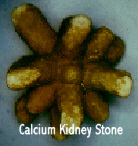The kidneys are a pair of
purplish-brown organs situated at the back of the abdominal cavity, lateral to the spinal
column. The kidneys form urine from blood plasma. They are the major regulators of the
water, electrolyte, and acid-base content of the blood and, indirectly, all body fluids.
Kidney stones are an abnormal concretion usually composed of crystalline urinary salts held
together by viscid organic matter. In the kidney, these stones can block urine flow. If
the ureter is blocked by the stone, there is sudden, severe, and paroxysmal renal colic
with chills, fever, hematuria, and frequency of urination. The prognosis is serious if
left untreated. Pain relief is a priority, and relaxing the smooth muscles will help in
passing the stone and relieving pain. If the stone is preventing urine flow or continues
to grow and causes infection, surgery may be indicated, or the stone may be disintegrated
ultrasonically.
Helpful Links:
Kidney Stones
s many as 10 percent of
American men and 5 percent of American women have a kidney stone at least once in their
lifetime. Usually composed of calcium, or crystalline urinary salts, stones form in the
kidneys when amounts of water, calcium oxylate, uric acid, and phosphate normally in the
kidneys become imbalanced. When the urine pH is abnormal or the kidneys' normal
protective mechanisms are overwhelmed, stones may also form.
 Some other factors that can contribute to
the formation of kidney stones include dehydration, cout or Cushing's disease, chemotherapy
for the treatment of cancer, or using certain drugs, such as thyroid medications, vitamin
D supplements, or antacids. Once the stones have crystallized and begin to move through
the urinary passageway, the pain can be excruciating in the area below the ribs and sometimes
radiating into the lower abdomen. The pain may also be accompanied by nausea, vomiting,
lack of appetite, and fever. If a stone completely blocks off the flow of urine, infection
can form and, if left untreated, can lead to permanent kidney damage. A medical evaluation
to rule out obstruction and to find the cause of the stones is necessary. Pain medication
and surgery may be recommended. There are many herbs that are helpful in alleviating the
pain of kidney stones when there is no obstruction or infection. They are also helpful for
those who have a tendency toward recurrence.
Some other factors that can contribute to
the formation of kidney stones include dehydration, cout or Cushing's disease, chemotherapy
for the treatment of cancer, or using certain drugs, such as thyroid medications, vitamin
D supplements, or antacids. Once the stones have crystallized and begin to move through
the urinary passageway, the pain can be excruciating in the area below the ribs and sometimes
radiating into the lower abdomen. The pain may also be accompanied by nausea, vomiting,
lack of appetite, and fever. If a stone completely blocks off the flow of urine, infection
can form and, if left untreated, can lead to permanent kidney damage. A medical evaluation
to rule out obstruction and to find the cause of the stones is necessary. Pain medication
and surgery may be recommended. There are many herbs that are helpful in alleviating the
pain of kidney stones when there is no obstruction or infection. They are also helpful for
those who have a tendency toward recurrence.
 Antispasmodic herbs are useful in relaxing
the ureter. Valerian Root
is particularly helpful as it is an antispasmodic and strongly sedative. It may be useful
in relaxing the ureter enough to allow a small stone to pass.
Scullcap and
Wild Yam, both
antispasmodics, are also helpful, but Wild Yam is not a sedative. If you need to stay awake,
Wild Yam is the herb you should take. Many herbs that help prevent recurring kidney stones
contain compounds called anthraquinones which bind with calcium in the urinary tract and
prevent it from crystallizing into a stone. These very often act as laxatives.
Yellow Dock is
traditionally used as a blood purifier, and contains anthraquinones. If diarrhea is
experienced while taking Yellow Dock, you may choose to decrease the dose. If the stones
are caused by an excess of uric acid,
Juniper berry may be helpful
as studies have shown it decreases the amount of uric acid in the body.
Antispasmodic herbs are useful in relaxing
the ureter. Valerian Root
is particularly helpful as it is an antispasmodic and strongly sedative. It may be useful
in relaxing the ureter enough to allow a small stone to pass.
Scullcap and
Wild Yam, both
antispasmodics, are also helpful, but Wild Yam is not a sedative. If you need to stay awake,
Wild Yam is the herb you should take. Many herbs that help prevent recurring kidney stones
contain compounds called anthraquinones which bind with calcium in the urinary tract and
prevent it from crystallizing into a stone. These very often act as laxatives.
Yellow Dock is
traditionally used as a blood purifier, and contains anthraquinones. If diarrhea is
experienced while taking Yellow Dock, you may choose to decrease the dose. If the stones
are caused by an excess of uric acid,
Juniper berry may be helpful
as studies have shown it decreases the amount of uric acid in the body.
 These
products are available from our
Virtual Store.
Our liberal
Money Back Guarantee applies.
These
products are available from our
Virtual Store.
Our liberal
Money Back Guarantee applies.
